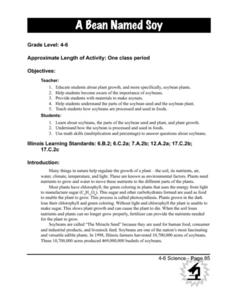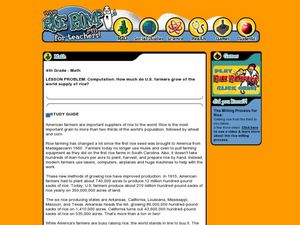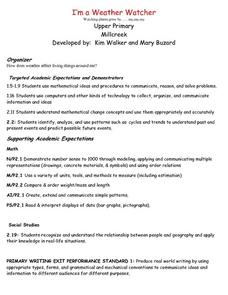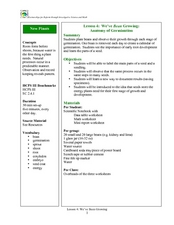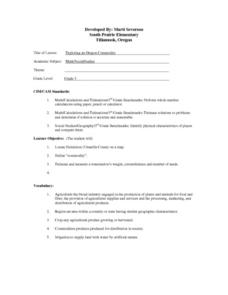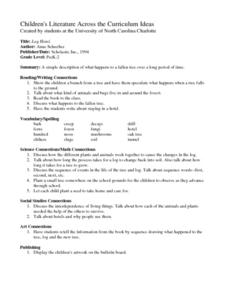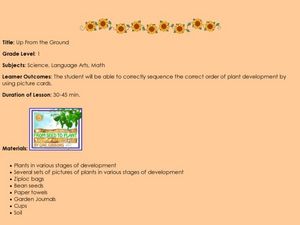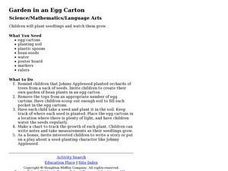Curated OER
Soybeans: The Miracle Seed
Students discover why soybeans are called the "miracle seeds." They make their own soynuts and share other foods made from soybeans. They create a bulletin board of soybean products.
Curated OER
Next Year's Seeds
Reading, a math game, and a simulation activity provide the engagement on a instructional activity about seeds and crops. Learners in grades two through four read an informational passage about crops, seeds, and farming. They highlight...
Curated OER
Spring Potted Plants
Students identify and interpret plant growth as well as gain graphing skills and other important knowledge related to potting plants. They take a regular milk jug and cut off the top, leaving the handle and the rest intact. Then,...
Captain Planet Foundation
Square Foot Fall Garden
First graders learn the basic needs of plants and identify geometric shapes while planting a fall garden. Combining math and science in one activity, the resource guides kids through starting their class garden as they...
Curated OER
Growing Plants
Students grow plants and track their growth over time. In this growing plants lesson plan, students plant seedlings and chart their growth in a data analysis activity.
Curated OER
Jack and the Beanstalk: Plant a Bean and Watch It Grow
Young scholars plant bean seeds, watch them grow, and measure them with non-standard objects. They describe the bean's growth in a journal and record the growth on a calendar.
Curated OER
How much rice to US farmers grow?
Fourth graders examine rice farming. In this rice farming activity, 4th graders compute how much of the world's rice the US produces. Students gain information about the history of growing rice and how much rice other countries grow as...
Curated OER
I'm a Weather Watcher Watching plants grow by......my,my,my
Students investigate how weather affects how plants grow. They collect data on weather and plant growth for a week and display the data on a graph. For a culminating experience they design a movie using software that shows plant growth...
Curated OER
Plant Systems
Second graders learn about plant systems and how plants grow and function. In this plant lesson plan, 2nd graders collect data based on roots, leaves, terrariums, plant uses, and locations of certain kinds of plants. They fill out...
Curated OER
Plant a Seed of Kindness
Students perform acts of kindness. For this character lesson, students cut out seed shapes and write down their acts of kindness on them. Students place the seeds on a bulletin board where they "plant" them below the grass...
Curated OER
How Does Your KinderGarden Grow
Students find forecast and graph weather by using WeatherBug site, create flower books by using Wiggleworks, and plant radish seeds both on KidPix and in class garden.
Curated OER
We’ve Bean Growing: Anatomy of Germination
Students identify the main parts of a seed. In this biology lesson, students explain the factors needed for the seed to grow. They record observations everyday and report findings to class.
Curated OER
A Seed Grows
Second graders begin the lesson by planting their own bean seed. Individually, they make predictions about how many leaves and roots their plant might grow and each day record their observations. They graph the results of the length of...
Curated OER
Seeds of Life
Students match real seeds with the corresponding names of fruits and vegetables. They answer discussion questions, and glue the seeds on the correct squares of a chart.
Curated OER
The Effects of Environment on Plant Growth: Selecting Seeds for Survival on a New Planet
Fifth graders conduct experiments to compare seed germination and plant growth rates. They construct a hydroponic plant unit and a lighthouse. They care for the plants for a month and collect data for graphs. They write a report.
Curated OER
Exploring and Oregon Commodity
A fun (and delicious!) lesson teaches measurement to your third graders. They work in small groups to first predict, then to measure the weight, circumference, and number of seeds found in a watermelon. Everyone gets to eat watermelon...
Curated OER
Graphing the Population Explosion of Weeds
Young scholars are introduced to the seed cycle and draw the specific steps. In groups, they identify the human barriers to the spreading of weeds. After calculating the rate of spreading of the Yellowstar Thistle, they create graphs to...
Curated OER
Log Hotel
Young scholars identify how the different plants and animals work together to cause the changes in the log. Students discuss the sequence of events in the life of the tree and log. Young scholars plant a seed to take home and care for....
Curated OER
Do They Grow Up or Down?
Young scholars keep a garden journal after planting a garden and discuss environmental stresses put upon the garden for growth. In this garden lesson plan, students plant the plants differently from one another and observe the outcomes.
Curated OER
Up From the Ground
First graders sequence the development of a plant. In this plant life lesson plan, 1st graders listen to a story about how a plant grows, students view a PowerPoint presentation and learn new vocabulary. Finally, students sequence the...
Curated OER
Gardening for Beauty, Food, and Enjoyment
First graders create their own garden. In this plant lesson, 1st graders discover the essential elements for a plant to grow. They planted their own garden and read the amount of space needed and the sunlight preferred for each plant.
Curated OER
Garden in an Egg Carton
Learners investigate the growth of seedlings planted in egg cartons in the classroom. Measurements are taken as the plants grow and charts created to organize the data.
Curated OER
Gardening and Foods
In this gardening and foods worksheet, students plan a garden, figure out what the garden will produce and how much money it will make, then read a selection about garden seeds and answer questions about each paragraph.
Curated OER
Let it Grow, Let it Grow, Let it Grow
Students investigate, through a hands-on activity, in which type of soil a bean seed grows best. They create a bar graph representing each plant's growth in different soils.


